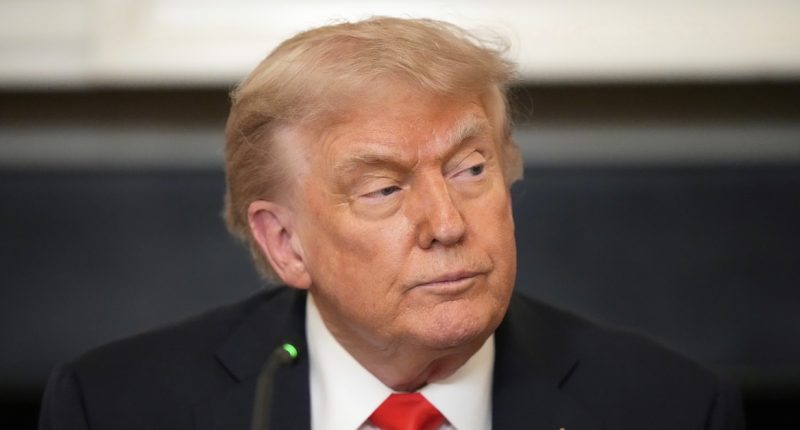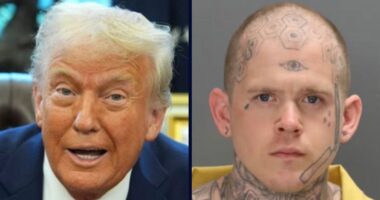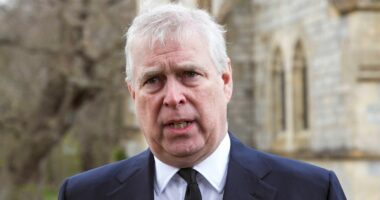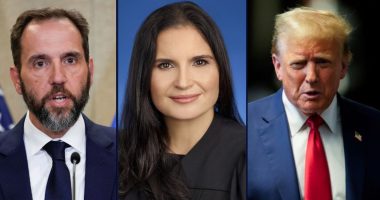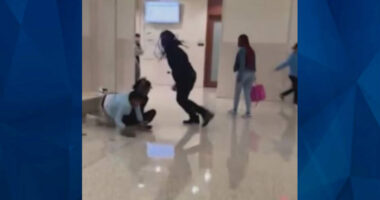Share this @internewscast.com
President Donald Trump participates in a session with the Fraternal Order of Police held in the State Dining Room of the White House on Thursday, June 5, 2025, in Washington (AP Photo/Alex Brandon).
A federal judge in Maine ruled on Friday to block the Trump administration from imposing penalties on two American citizens and human rights activists collaborating with the International Criminal Court (ICC).
On April 11, Matthew Smith, who leads a human rights nonprofit, and Akila Radhakrishnan, a legal expert, initiated a 39-page legal action against President Donald Trump and several other administration officials. This action challenges an executive order that places sanctions on the ICC, restricts specified engagements with designated ICC personnel, and includes possible civil and criminal repercussions for such breaches.
The lawsuit was premised on the idea that the sanctions “violate their First Amendment rights, and those of others like them, by prohibiting their constitutionally protected speech.” The plaintiffs, in late April, requested a preliminary injunction barring the government “from imposing civil or criminal penalties on them” for “provision of speech-based services” to the ICC”s Office of the Prosecutor (OTP).
Now, U.S. District Judge Nancy Torresen, a Barack Obama appointee, has granted that requested relief in a 16-page order.
“[T]he Executive Order appears to burden substantially more speech than necessary,” the judge wrote. “Accordingly, the Plaintiffs have established likely success on the merits of their First Amendment challenge.”
The government argued Trump’s order advanced a “compelling” and “important” interest in “protecting the personnel of the United States and its allies from investigation, arrest, detention, and prosecution by the ICC without the consent of the United States or its allies.”
The judge, however, found the executive order too broadly written and mused that it “appears to restrict substantially more speech than necessary to further that end.”
In Executive Order 14203, titled, “Imposing Sanctions on the International Criminal Court,” the 45th and 47th president said he was motivated by the ICC’s “illegitimate and baseless actions targeting America and [its] close ally Israel.”
The court takes stock of the president’s cited justification for issuing the sanctions, at length:
The Executive Order condemns the ICC’s investigations of U.S. and Israeli personnel and its issuance of arrest warrants for Israel’s current Prime Minister and former Minister of Defense. The Executive Order, emphasizing that neither the U.S. nor Israel is a party to the ICC’s founding treaty, asserts that the ICC’s conduct “threatens to infringe upon” U.S. sovereignty and “undermin[es]” the “critical national security and foreign policy work” of the United States, Israel, and other U.S. allies
But, the court notes, the plaintiffs’ work has nothing to do with the United States or Israel. Rather, the court explains, Smith’s work has focused on “the OTP’s investigation and prosecution of atrocity crimes against the ethnic minority Rohingya people in the People’s Republic of Bangladesh and the Republic of the Union of Myanmar.” And Radhakrishnan’s work has focused on “matters involving sexual and gender-based violence, particularly in Afghanistan.”
The judge then applies the executive order as written to the facts alleged by the plaintiff’s about their work for the ICC’s OTP.
“The Executive Order broadly prohibits any speech-based services that benefit the Prosecutor, regardless of whether those beneficial services relate to an ICC investigation of the United States, Israel, or another U.S. ally,” the order reads. “The Government does not explain how its stated interest would be undermined—or even impacted—by the Plaintiffs’ services to the OTP related to the ICC’s ongoing work in Bangladesh, Myanmar, and Afghanistan.”
Torresen goes on to say the plaintiffs’ “irreparable injury is presumed” due to the nature of a First Amendment claim. Here, the judge is essentially saying a violation of the free speech guarantee in the nation’s founding charter is a sufficient injury alone – and does not need to be extensively analyzed.
Notably, while the court notes the plaintiffs alleged Trump’s order “violates the First Amendment” and was in excess of the International Emergency Economic Powers Act (IEEPA), the court did not reach the IEEPA claim.
Finally, the judge balanced the equities – pitting the plaintiffs’ First Amendment injury against the defendant’s interest in “national security and foreign policy interests.” Again, the human rights advocates came out on top.
“I find the Government’s argument unpersuasive,” Torresen intones. “First, the Government has at least implied that injunctive relief is unnecessary because it does not intend to enforce the Executive Order against the Plaintiffs at all. It is hard to square that position with the Government’s assertion that an injunction would impede national security and foreign policy interests.”
In other words, the court says the government is trying to have things both ways by insisting they would never target the plaintiffs while also arguing an order barring them from going after the plaintiffs would be detrimental.
The court then returns to the factual record of the executive order’s stated goals and the plaintiff’s actual human rights work.
“Second, even putting that inconsistency aside, I find the Government’s argument unpersuasive for the same reasons that I find Section 3(a) fails intermediate scrutiny,” the order goes on. “The Government does not explain how the Plaintiffs’ continued services to the Prosecutor concerning atrocities in Bangladesh, Myanmar, or Afghanistan would impede national security and foreign policy interests concerning the United States and Israel.”
The court, in the end, barred the government from sanctioning the plaintiffs for their work with the ICC’s OTP.
“The Government is hereby enjoined from imposing civil or criminal penalties on the Plaintiffs under Executive Order 14203,” the order concludes.
